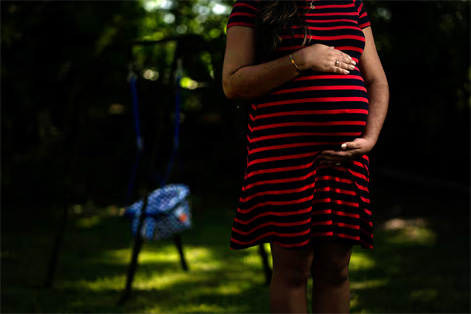|
A law
enforcement
officer
stands
guard on
the day
the
Supreme
Court
justices
hear
oral
arguments
over
U.S.
President
Donald
Trump's
bid to
broadly
enforce
his
executive
order to
restrict
automatic
birthright
citizenship,
during a
protest
outside
the U.S.
Supreme
Court in
Washington,
D.C.,
U.S.,
May 15,
2025.
REUTERS/Nathan
Howard |
|
|
|
|
|
 |
 |
 |
|
|
|
|
|
|
 |
|
|
A
35-year
old
pregnant
asylum-seeker
from
Cuba,
poses
for a
portrait
in
Louisville,
Kentucky,
U.S.,
May 9,
2025.
REUTERS/Kevin
Wurm/File
Photo |
| |
The
Supreme
Court
weighs
nationwide
injunctions
and
Birthright
Citizenship
order
Li Haung
-
National-Politics
Tell Us
USA News
Network
WASHINGTON
- The
Supreme
Court
heard
pivotal
arguments
Thursday,
tackling
two
major
legal
questions:
Can a
single
federal
judge
block a
presidential
policy
nationwide?
And does
the
president
have the
authority
to end
birthright
citizenship
for
certain
children
born in
the
U.S.? At
the
heart of
the case
is
President
Trumpís
executive
order
aiming
to deny
citizenship
to
children
born to
undocumented
immigrants
and
temporary
visa
holdersóa
move
that has
sparked
intense
legal
debate.
Key
Issues
at Stake
Nationwide
Injunctions
Several
justices
expressed
skepticism
about
whether
a single
district
judge
should
wield
the
power to
halt
federal
policies
across
the
country.
The
Trump
administration
contends
that
injunctions
should
be
limited
to
plaintiffs
and the
states
involved
in
lawsuits,
rather
than
imposing
nationwide
restrictions.
This
would
allow
the
policy
to be
implemented
in
states
that are
not part
of the
legal
challenge,
influencing
how
federal
actions
are
contested
moving
forward.
Legality
of the
Executive
Order
The
justices
also
scrutinized
whether
Trumpís
order
aligns
with
constitutional
principles.
His
directive
seeks to
deny
citizenship
unless
at least
one
parent
is a
U.S.
citizen
or legal
permanent
resident.
Lower
courts
swiftly
blocked
the
order,
citing
violations
of the
14th
Amendment
and
longstanding
Supreme
Court
precedent.
Legal
scholars
overwhelmingly
agree
that
birthright
citizenship
is
constitutionally
protected
and
cannot
be
unilaterally
dismantled
by
executive
action.
Historical
and
Legal
Foundations
The 14th
Amendment,
adopted
post-Civil
War, has
been
broadly
interpreted
to grant
citizenship
to
nearly
everyone
born on
U.S.
soil,
with
exceptions
for
children
of
diplomats.
In 1898,
the
Supreme
Courtís
ruling
in
United
States
v. Wong
Kim Ark
reaffirmed
this
interpretation,
and
Congress
formally
codified
it in
1940.
What
Happens
Next?
A ruling
from the
Supreme
Court
could
reshape
how
executive
orders
are
challenged.
If the
justices
side
with the
Trump
administration,
lower
courts
will
face
restrictions
in
blocking
federal
policies
on a
nationwide
scale,
altering
the
speed
and
scope of
legal
battles.
However,
if the
Court
upholds
the
injunctions,
it will
reinforce
the
judiciaryís
ability
to check
presidential
power.
Notably,
the
justices
have yet
to rule
directly
on the
constitutionality
of
Trumpís
order;
the
current
focus
remains
procedural.
A final
decision
could
arrive
by late
June or
early
July,
although
the
caseís
significance
may
accelerate
the
ruling
process.
Broader
Implications
Beyond
birthright
citizenship,
the
Courtís
decision
will
shape
the
balance
of power
between
the
executive
branch
and the
judiciary.
The
outcome
could
redefine
how and
where
legal
challenges
to
federal
policies
unfold,
with
lasting
effects
on
immigration
law,
judicial
oversight,
and
presidential
authority.
|
|
|
|
|
|
|
|
|